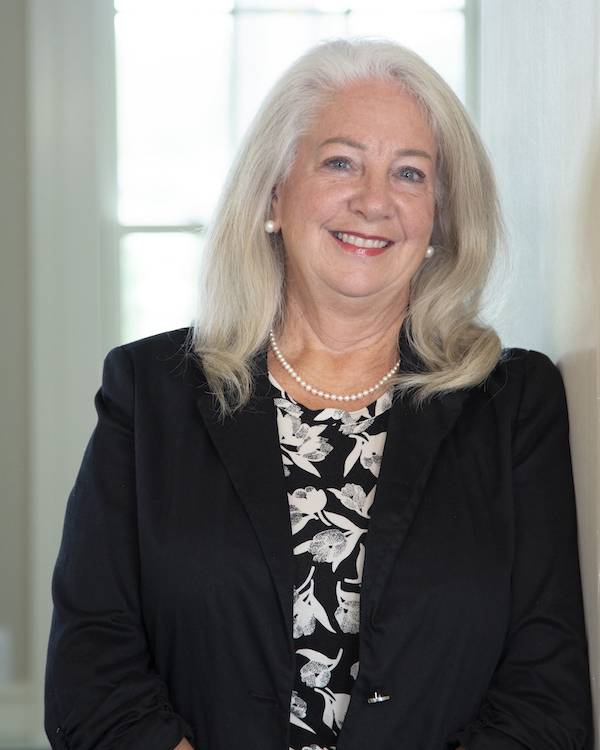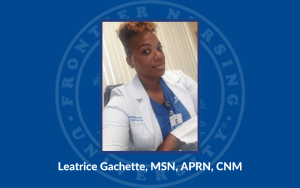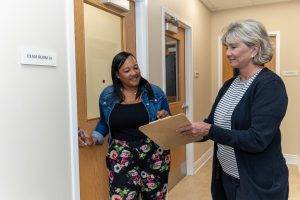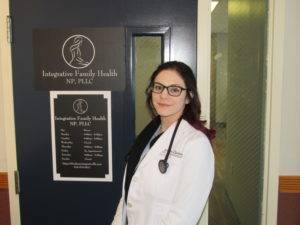
Dean of Nursing
Joan Slager, CNM, DNP, FACNM, FAAN
This article was written by Frontier Nursing University (FNU) Dean of Nursing, Dr. Joan Slager, DNP, CNM, FACNM, FAAN and was originally published by ACEN.
Just as Frontier Nursing University (FNU) teaches its students to understand and address the needs of the communities they serve across the country, the FNU faculty and staff are keenly aware of the needs of our student community. Those needs are ever-changing, never more so than during the COVID-19 pandemic. I am incredibly proud of how our faculty and staff acted with tremendous efficiency, professionalism, and care to ensure the best possible outcomes for our students.
As the first wave of COVID-19 grew and spread, FNU began receiving notices from many of our clinical partners that they were either limiting or eliminating clinical rotations for students. By April 24, 2020, 140 clinical organizations had suspended all student rotations and 13 clinical organizations had implemented restrictions but had not suspended all student rotations. Thus, 289 students had rotations impacted by COVID-19 restrictions or cancellations between March and July. Some of our students were about to travel to campus for a skills-intensive session to prepare for clinical rotations.
Some students were abruptly without clinical sites in the middle of their clinical experience, and some could see the finish line, but no longer had the opportunity to complete their final clinical hours. In the DNP program, carefully planned quality improvement projects imploded as patient visits decreased or priorities shifted in the sites.
Faced with these urgent issues, the FNU team rapidly went into problem-solving mode. As President Stone reminded us, with our expanding use of technology to develop and refine a quality education program for students all over the country, while maintaining a sense of community, we have prepared for this for years.
Within a few short weeks, the following programming and policies had been developed:
- Regional clinical faculty and didactic faculty developed simulated and web-based activities that could be counted as clinical hours, thus allowing progress in clinical courses. Students who had met a minimum of 500 face-to-face clinical hours used these experiences to complete their clinical hours and graduate.
- Policies allowing telehealth visits in the family nurse practitioner, women’s health nurse practitioner, and midwifery programs were approved.
- The number of telehealth hours permissible in the psychiatric mental health nurse practitioner program was increased.
- Virtual clinical preparation courses were developed for all programs. Students joined faculty via telecommunication sessions and practiced skills in preparation for clinical.
- The DNP faculty developed four virtual quality improvement projects, allowing students to continue progress toward their Doctor of Nursing Practice degrees.
 The efficient and well-planned development and implementation of these measures were vital to our students, many of whom would have had to go on hiatus or even withdraw from the university if these options were not available to them.
The efficient and well-planned development and implementation of these measures were vital to our students, many of whom would have had to go on hiatus or even withdraw from the university if these options were not available to them.
As the year continued to be challenged by the pandemic, the adjustments that were developed to enable students to continue to progress in their clinical education provided some valuable insight and lessons for the faculty and students. The faculty discovered that some of the skills taught during on-campus clinical sessions could be improved using the technology employed during the virtual clinical bounds. For example, demonstrating suturing techniques on a large display screen was more beneficial than when a single instructor circulated around a room of students practicing this skill. The simulated clinical scenarios that were taught in a virtual environment demonstrated the value of incorporating simulations into the clinical courses to enhance students’ exposure to infrequent clinical presentations or to facilitate evaluation or remediation.
In all tracks, the initial clinical courses were converted to a virtual format taught by a combination of didactic and clinical faculty. Students practiced foundational clinical skills such as taking a patient’s history, critical thinking, and clinical reasoning guided by expert faculty. The feedback from students and their preceptors revealed that students demonstrated more confidence and were better prepared for clinical experiences after completion of the virtual courses. As clinical sites began reopening to students, the tangible evidence that some clinical preparation beyond the one-week intensive clinical-bound week was beneficial led to the development of a hybrid approach to the clinical courses. Currently, all students receive an initial 30‒60 hours of virtual clinical instruction led by faculty in a simulated environment, and the remainder of the hours are fulfilled in the clinical sites.
Prior to the pandemic, the psychiatric-mental health nurse practitioner (PMHNP) students spent about 10% of their clinical time providing care via telehealth. Although discussions about including telehealth in the other program tracks had occurred, no provisions for this had been developed. Many clinical practices rapidly converted to providing some visits via telehealth, which accelerated the development of policies and procedures that allowed students in all tracks to participate in telehealth visits with their preceptors. In the PMHNP program, the utilization of telehealth increased to 70%.
While telehealth as a care delivery modality preceded the pandemic, its utilization has expanded exponentially, especially in rural communities. Recognizing the need to prepare our graduates to deliver care via telehealth, software was purchased that will facilitate the incorporation of simulations into our programs across the curriculum as well as enable us to teach students how to provide healthcare via telehealth.
While many universities struggled with the challenges associated with the COVID-19 pandemic, FNU seized the opportunity to adapt, learn, and improve our programs. These examples of flexibility, creativity, and resilience are part of our heritage.
In-person Frontier Bound orientation sessions and Clinical Bound sessions are returning at FNU, and the innovative teaching methods that were seen throughout the pandemic will continue to be used in our distance education programs. The pandemic has taught our faculty and staff ways to enhance the in-person experience at Clinical Bound and to improve the didactic portion of our programs.
Are you interested in learning more about what programs FNU has to offer? Fill out this form to start the conversation today!



 There have been many stories and statements suggesting that the COVID-19 pandemic has changed life as we know it forever. Regardless of what the future holds, Amanda Dunham, DNP, FNP-C, Class 29, said that the call to serve remains the same.
There have been many stories and statements suggesting that the COVID-19 pandemic has changed life as we know it forever. Regardless of what the future holds, Amanda Dunham, DNP, FNP-C, Class 29, said that the call to serve remains the same. 


















 Carrie Belin is an experienced board-certified Family Nurse Practitioner and a graduate of the Johns Hopkins DNP program, Johns Hopkins Bloomberg School of Public Health, Georgetown University School of Nursing, and Johns Hopkins School of Nursing. She has also completed fellowships at Georgetown and the University of California Irvine.
Carrie Belin is an experienced board-certified Family Nurse Practitioner and a graduate of the Johns Hopkins DNP program, Johns Hopkins Bloomberg School of Public Health, Georgetown University School of Nursing, and Johns Hopkins School of Nursing. She has also completed fellowships at Georgetown and the University of California Irvine. Angie has been a full-scope midwife since 2009. She has experience in various birth settings including home, hospital, and birth centers. She is committed to integrating the midwifery model of care in the US. She completed her master’s degree in nurse-midwifery at Frontier Nursing University (FNU) and her Doctorate at Johns Hopkins University. She currently serves as the midwifery clinical faculty at FNU. Angie is motivated by the desire to improve the quality of healthcare and has led quality improvement projects on skin-to-skin implementation, labor induction, and improving transfer of care practices between hospital and community midwives. In 2017, she created a short film on skin-to-skin called
Angie has been a full-scope midwife since 2009. She has experience in various birth settings including home, hospital, and birth centers. She is committed to integrating the midwifery model of care in the US. She completed her master’s degree in nurse-midwifery at Frontier Nursing University (FNU) and her Doctorate at Johns Hopkins University. She currently serves as the midwifery clinical faculty at FNU. Angie is motivated by the desire to improve the quality of healthcare and has led quality improvement projects on skin-to-skin implementation, labor induction, and improving transfer of care practices between hospital and community midwives. In 2017, she created a short film on skin-to-skin called 










 Justin C. Daily, BSN, RN, has ten years of experience in nursing. At the start of his nursing career, Justin worked as a floor nurse on the oncology floor at St. Francis. He then spent two years as the Director of Nursing in a small rural Kansas hospital before returning to St. Francis and the oncology unit. He has been in his current position as the Chemo Nurse Educator for the past four years. He earned an Associate in Nurse from Hutchinson Community College and a Bachelor of Science in Nursing from Bethel College.
Justin C. Daily, BSN, RN, has ten years of experience in nursing. At the start of his nursing career, Justin worked as a floor nurse on the oncology floor at St. Francis. He then spent two years as the Director of Nursing in a small rural Kansas hospital before returning to St. Francis and the oncology unit. He has been in his current position as the Chemo Nurse Educator for the past four years. He earned an Associate in Nurse from Hutchinson Community College and a Bachelor of Science in Nursing from Bethel College. Brandy Jackson serves as the Director of Undergraduate Nursing Programs and Assistant Educator at Wichita State University and Co-Director of Access in Nursing. Brandy is a seasoned educator with over 15 years of experience. Before entering academia, Brandy served in Hospital-based leadership and Critical Care Staff nurse roles. Brandy is passionate about equity in nursing education with a focus on individuals with disabilities. Her current research interests include accommodations of nursing students with disabilities in clinical learning environments and breaking down barriers for historically unrepresented individuals to enter the nursing profession. Brandy is also actively engaged in Interprofessional Education development, creating IPE opportunities for faculty and students at Wichita State. Brandy is an active member of Wichita Women for Good and Soroptimist, with the goal to empower women and girls. Brandy is a TeamSTEPPS master trainer. She received the DASIY Award for Extraordinary Nursing Faculty in 2019 at Wichita State University.
Brandy Jackson serves as the Director of Undergraduate Nursing Programs and Assistant Educator at Wichita State University and Co-Director of Access in Nursing. Brandy is a seasoned educator with over 15 years of experience. Before entering academia, Brandy served in Hospital-based leadership and Critical Care Staff nurse roles. Brandy is passionate about equity in nursing education with a focus on individuals with disabilities. Her current research interests include accommodations of nursing students with disabilities in clinical learning environments and breaking down barriers for historically unrepresented individuals to enter the nursing profession. Brandy is also actively engaged in Interprofessional Education development, creating IPE opportunities for faculty and students at Wichita State. Brandy is an active member of Wichita Women for Good and Soroptimist, with the goal to empower women and girls. Brandy is a TeamSTEPPS master trainer. She received the DASIY Award for Extraordinary Nursing Faculty in 2019 at Wichita State University.  Dr. Sabrina Ali Jamal-Eddine is an Arab-disabled queer woman of color with a PhD in Nursing and an interdisciplinary certificate in Disability Ethics from the University of Illinois Chicago (UIC). Dr. Jamal-Eddine’s doctoral research explored spoken word poetry as a form of critical narrative pedagogy to educate nursing students about disability, ableism, and disability justice. Dr. Jamal-Eddine now serves as a Postdoctoral Research Associate in UIC’s Department of Disability and Human Development and serves on the Board of Directors of the National Organization of Nurses with Disabilities (NOND). During her doctoral program, Sabrina served as a Summer Fellow at a residential National Endowment of the Humanities (NEH) Summer Institute at Arizona State University (2023), a summer fellow at Andrew W. Mellon’s National Humanities Without Walls program at University of Michigan (2022), a Summer Research Fellow at UC Berkeley’s Othering & Belonging Institute (2021), and an Illinois Leadership Education in Neurodevelopmental and related Disabilities (LEND) trainee (2019-2020).
Dr. Sabrina Ali Jamal-Eddine is an Arab-disabled queer woman of color with a PhD in Nursing and an interdisciplinary certificate in Disability Ethics from the University of Illinois Chicago (UIC). Dr. Jamal-Eddine’s doctoral research explored spoken word poetry as a form of critical narrative pedagogy to educate nursing students about disability, ableism, and disability justice. Dr. Jamal-Eddine now serves as a Postdoctoral Research Associate in UIC’s Department of Disability and Human Development and serves on the Board of Directors of the National Organization of Nurses with Disabilities (NOND). During her doctoral program, Sabrina served as a Summer Fellow at a residential National Endowment of the Humanities (NEH) Summer Institute at Arizona State University (2023), a summer fellow at Andrew W. Mellon’s National Humanities Without Walls program at University of Michigan (2022), a Summer Research Fellow at UC Berkeley’s Othering & Belonging Institute (2021), and an Illinois Leadership Education in Neurodevelopmental and related Disabilities (LEND) trainee (2019-2020). Vanessa Cameron works for Vanderbilt University Medical Center in Nursing Education & Professional Development. She is also attending George Washington University and progressing towards a PhD in Nursing with an emphasis on ableism in nursing. After becoming disabled in April 2021, Vanessa’s worldview and perspective changed, and a recognition of the ableism present within healthcare and within the culture of nursing was apparent. She has been working since that time to provide educational foundations for nurses about disability and ableism, provide support for fellow disabled nursing colleagues, and advocate for the disabled community within healthcare settings to reduce disparities.
Vanessa Cameron works for Vanderbilt University Medical Center in Nursing Education & Professional Development. She is also attending George Washington University and progressing towards a PhD in Nursing with an emphasis on ableism in nursing. After becoming disabled in April 2021, Vanessa’s worldview and perspective changed, and a recognition of the ableism present within healthcare and within the culture of nursing was apparent. She has been working since that time to provide educational foundations for nurses about disability and ableism, provide support for fellow disabled nursing colleagues, and advocate for the disabled community within healthcare settings to reduce disparities. Dr. Lucinda Canty is a certified nurse-midwife, Associate Professor of Nursing, and Director of the Seedworks Health Equity in Nursing Program at the University of Massachusetts Amherst. She earned a bachelor’s degree in nursing from Columbia University, a master’s degree from Yale University, specializing in nurse-midwifery, and a PhD from the University of Connecticut. Dr. Canty has provided reproductive health care for over 29 years. Her research interests include the prevention of maternal mortality and severe maternal morbidity, reducing racial and ethnic health disparities in reproductive health, promoting diversity in nursing, and eliminating racism in nursing and midwifery.
Dr. Lucinda Canty is a certified nurse-midwife, Associate Professor of Nursing, and Director of the Seedworks Health Equity in Nursing Program at the University of Massachusetts Amherst. She earned a bachelor’s degree in nursing from Columbia University, a master’s degree from Yale University, specializing in nurse-midwifery, and a PhD from the University of Connecticut. Dr. Canty has provided reproductive health care for over 29 years. Her research interests include the prevention of maternal mortality and severe maternal morbidity, reducing racial and ethnic health disparities in reproductive health, promoting diversity in nursing, and eliminating racism in nursing and midwifery. Dr. Lisa Meeks is a distinguished scholar and leader whose unwavering commitment to inclusivity and excellence has significantly influenced the landscape of health professions education and accessibility. She is the founder and executive director of the DocsWithDisabilities Initiative and holds appointments as an Associate Professor in the Departments of Learning Health Sciences and Family Medicine at the University of Michigan.
Dr. Lisa Meeks is a distinguished scholar and leader whose unwavering commitment to inclusivity and excellence has significantly influenced the landscape of health professions education and accessibility. She is the founder and executive director of the DocsWithDisabilities Initiative and holds appointments as an Associate Professor in the Departments of Learning Health Sciences and Family Medicine at the University of Michigan. Dr. Nikia Grayson, DNP, MSN, MPH, MA, CNM, FNP-C, FACNM (she/her) is a trailblazing force in reproductive justice, blending her expertise as a public health activist, anthropologist, and family nurse-midwife to champion the rights and health of underserved communities. Graduating with distinction from Howard University, Nikia holds a bachelor’s degree in communications and a master’s degree in public health. Her academic journey also led her to the University of Memphis, where she earned a master’s in medical anthropology, and the University of Tennessee, where she achieved both a master’s in nursing and a doctorate in nursing practice. Complementing her extensive education, she completed a post-master’s certificate in midwifery at Frontier Nursing University.
Dr. Nikia Grayson, DNP, MSN, MPH, MA, CNM, FNP-C, FACNM (she/her) is a trailblazing force in reproductive justice, blending her expertise as a public health activist, anthropologist, and family nurse-midwife to champion the rights and health of underserved communities. Graduating with distinction from Howard University, Nikia holds a bachelor’s degree in communications and a master’s degree in public health. Her academic journey also led her to the University of Memphis, where she earned a master’s in medical anthropology, and the University of Tennessee, where she achieved both a master’s in nursing and a doctorate in nursing practice. Complementing her extensive education, she completed a post-master’s certificate in midwifery at Frontier Nursing University.









 Dr. Tia Brown McNair is the Vice President in the Office of Diversity, Equity, and Student Success and Executive Director for the Truth, Racial Healing, and Transformation (TRHT) Campus Centers at the American Association of Colleges and Universities (AAC&U) in Washington, DC. She oversees both funded projects and AAC&U’s continuing programs on equity, inclusive excellence, high-impact practices, and student success. McNair directs AAC&U’s Summer Institutes on High-Impact Practices and Student Success, and TRHT Campus Centers and serves as the project director for several AAC&U initiatives, including the development of a TRHT-focused campus climate toolkit. She is the lead author of From Equity Talk to Equity Walk: Expanding Practitioner Knowledge for Racial Justice in Higher Education (January 2020) and Becoming a Student-Ready College: A New Culture of Leadership for Student Success (July 2016 and August 2022 Second edition).
Dr. Tia Brown McNair is the Vice President in the Office of Diversity, Equity, and Student Success and Executive Director for the Truth, Racial Healing, and Transformation (TRHT) Campus Centers at the American Association of Colleges and Universities (AAC&U) in Washington, DC. She oversees both funded projects and AAC&U’s continuing programs on equity, inclusive excellence, high-impact practices, and student success. McNair directs AAC&U’s Summer Institutes on High-Impact Practices and Student Success, and TRHT Campus Centers and serves as the project director for several AAC&U initiatives, including the development of a TRHT-focused campus climate toolkit. She is the lead author of From Equity Talk to Equity Walk: Expanding Practitioner Knowledge for Racial Justice in Higher Education (January 2020) and Becoming a Student-Ready College: A New Culture of Leadership for Student Success (July 2016 and August 2022 Second edition).